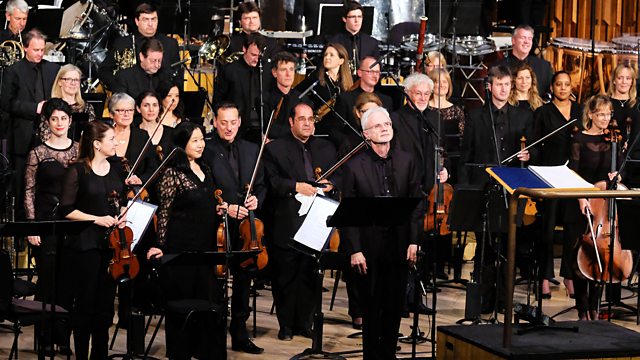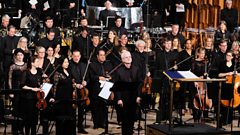
John Adams's Doctor Atomic
John Adams conducts his own opera Doctor Atomic at the Barbican, with the ����ý Symphony Orchestra and ����ý Singers. Starring baritone Gerald Finley and soprano Julia Bullock.
John Adams conducts his opera Doctor Atomic at the Barbican with the ����ý Symphony Orchestra, ����ý Singers and star cast including baritone Gerald Finley as Dr J. Robert Oppenheimer.
Presented by Andrew McGregor
John Adams:
Doctor Atomic Act 1
7.30pm Interval: Andrew McGregor talks to John Adams about the creation of the opera, and discusses John Adams at 70 with Alex Ross, the music critic of the New Yorker and author of "The Rest Is Noise."
Doctor Atomic Act 2
Dr. J. Robert Oppenheimer ..... Gerald Finley (baritone)
Kitty ..... Julia Bullock (soprano)
Edward Teller ..... Brindley Sherratt (bass)
Robert Wilson, physicist ..... Andrew Staples (tenor)
Pasqualita ..... Jennifer Johnston (mezzo-soprano)
General Leslie Groves ..... Aubrey Allicock (bass-baritone)
Jack Hubbard ..... Marcus Farnsworth (baritone)
Captain James Nolan ..... Samuel Sakker (tenor)
����ý Singers
����ý Symphony Orchestra
Chorus Master: Matthew Morley
Director: Kenneth Richardson
John Adams (conductor)
John Adams conducts his 2005 operatic docudrama about Dr J Robert Oppenheimer and the first detonation of an atomic bomb in the desert near Los Alamos, New Mexico, on 16 July 1945. A troubling and ever-contemporary story, Adams follows the characters involved in the Manhattan Project over two days: an evening in June 1945 and night of the test itself. The libretto, created by Peter Sellars, draws on original source material, including personal memoirs, recorded interviews, technical manuals of nuclear physics, declassified government documents and poetry.
This performance was recorded at the Barbican on 25 April, to great acclaim. In the words of The Guardian: "You couldn't fault the performance. Adams's conducting, second to none in his own music, had tremendous conviction and unique authority, with every facet of the score's terrible beauty laid bare. There was thrilling playing and choral singing from the ����ý Symphony Orchestra and Singers. Returning to the role he created in 2005, Gerald Finley conveyed Oppenheimer's moral agony with singing of great refinement and subtlety: Batter My Heart, in which scientific wonder gives way to the awareness of the enormity of what he is about to unleash, was overwhelming.".
Last on
More episodes
Music Played
-
![]()
John Adams
Doctor Atomic - Act 1
Singer: Gerald Finley. Singer: Julia Bullock. Singer: Jennifer Johnston. Singer: Brindley Sherratt. Singer: Andrew Staples. Singer: Marcus Farnsworth. Singer: Aubrey Allicock. Choir: ����ý Singers. Orchestra: ����ý Symphony Orchestra. Conductor: John Adams. -
![]()
Richard Wagner
Der Ring des Nibelungen (Walhall transc Liszt)
Performer: Mikhail Rudy.- Wagner: Siegfried-Idyll: Mikhail Rudy.
- EMI Classics.
- 3.
Synopsis
Act ONE
Scene 1 The Manhattan Project laboratory at Los Alamos, New Mexico, June 1945. An opening chorus describes the scientific principles behind the construction of the atom bomb. Director of the Manhattan Project , Robert J. Oppenheimer, is in discussion with one of his colleagues,
Edward Teller. Teller shows him a letter he has received from physicist Leo Szilard, which puts forward the case against using the bomb on densely populated areas. Another scientist working on the project, Robert Wilson, is also setting up a meeting in the lab to talk about the social and moral implications of using the bomb (or ‘gadget’, as it is called). Oppenheimer warns the young physicist that meddling in political affairs will land him in trouble.
Scene 2 The Oppenheimers’ house at Los Alamos. Clearly disturbed by these animated discussions, Oppenheimer returns to his home in Los Alamos, to his wife Kitty and their two young children, who are looked after by a Tewa Indian maid, Pasqualita. Alone with Kitty, Oppenheimer remains preoccupied with his work. She asks him, quoting a poem by Muriel Rukeyser, ‘Am I in your light?’ Oppenheimer responds by quoting a poem by Baudelaire. He becomes intoxicated by the poem’s tactile and olfactory sensuousness, but it only serves to expose a sense of isolation and feeling of impending doom that engulf his thoughts.
Scene 3 The ‘Trinity’ test site at Alamogordo, New Mexico, 15 July 1945. The night before the first atomic bomb test is due to take place. We are now at the ‘Trinity’ test site at Alamogordo. The music is dark and threatening, full of breathless rhythmic pulses. Pressure is increasing on Oppenheimer and General Leslie Groves, US commander of the project, to achieve a successful test. To add to the tension, the weather on the desert floor has changed abruptly, resulting in a freak electrical storm. The bomb, partially armed and mounted in its place on a high tower, is in danger of being struck by lightning. Groves accuses the chief meteorologist, Frank Hubbard, of being unable to predict the sudden change in conditions.
To the sound of a sinister low pedal note, Captain James Nolan, of the Army Medical Corps, reminds Groves about the deadly effects of plutonium, which ‘eats through vital tissues’. An accident at the test site would be catastrophic. Groves speaks to Oppenheimer alone. They engage in a more light-hearted conversation. With Groves gone, Oppenheimer is left to struggle with the psychological demons that plague his thoughts. He turns once more to the cathartic power of poetry. The music recalls the repeated-note idea heard at the beginning of the opera. Oppenheimer sings the words of John Donne’s sonnet ‘Batter my heart, three-person’d God’, before plunging into the moral darkness and chaos that await him.
��
Act TWO
Scene 1 The Oppenheimers’ house at Los Alamos, that same night. All the characters’ thoughts are consumed and their actions controlled by the bomb. Kitty and Pasqualita sit alone in the living room. They drink whiskey, waiting apprehensively for news from Alamogordo. Kitty sings about war, death and the resurrection of the spirit. Her passionate soliloquy has a brief calming effect and an orchestral interlude follows, depicting rain over the Sangre de Cristo Mountains. Kitty’s seven-month-old baby wakes up, crying, and is soothed by Pasqualita, who sings a Tewa lullaby. Pasqualita’s attitude to nature is in stark contrast to General Groves, who damns it for interfering with his plans.
Scene 2 The ‘Trinity’ test site at Alamogordo, midnight 16 July 1945. The plutonium bomb has been mounted on the detonation tower and all personnel have left, except for Wilson and Hubbard. Wilson climbs the tower one last time to attach a measuring instrument to the bomb. He sees flashes of lightning in the distance and confesses to Hubbard his anxiety at being so close to the bomb in such treacherous conditions. For Hubbard, a test in such weather is madness.
Groves, Oppenheimer and the others wait nervously at the Base Camp observation bunker. Teller suggests that detonation could set off an uncontrolled chain reaction igniting the earth’s atmosphere, ending in its complete destruction. Groves disregards Hubbard’s warnings and orders the test to go off at 5.30am.
Scene 3 (Countdown Part 1) The ‘Trinity’ test site/The Oppenheimers’ house. The first countdown begins at 5.10am. Intensely animated, Groves vents his frustration with the scientists on the programme. Each is absorbed in his own thoughts. Oppenheimer’s mood becomes increasingly unpredictable. He tries to calm himself by reading from a battered book of poetry. Meanwhile in Los Alamos, Pasqualita, having drunk heavily during the night, starts experiencing her own visions, proclaiming: ‘The dead are on the march!’
At Base Camp the men try to guess what the bomb’s yield will be. The supreme irony of scientists resorting to guesswork is not lost on Groves. Gripped by a realisation of the inevitable, Oppenheimer has a terrifying vision of the Hindu god Vishnu, sung by the chorus.
Scene 4 (Countdown Part 2) The ‘Trinity’ test site/The Oppenheimers’ house. Oppenheimer looks again to Baudelaire for answers: ‘Time has disappeared; it is eternity that reigns!’ A siren goes off and the music falls silent for a moment. Hubbard states that the weather conditions are now favourable enough to continue. Even nature cannot now avert the inevitable.
At Zero minus 60 seconds, the third warning rocket appears in the morning sky, signalling the final countdown to a panoply of clocks, some pounding like pile-drivers, in different tempos. Kitty wakes up, singing in a soaring voice that ‘dreams wake in the night … calling your name.’ She thinks she is in a dream but wakes up to a nightmare that is about to happen. As the countdown continues, the characters onstage look out beyond the Brechtian ‘fourth wall’ to the horizon. With seconds to go, the music increases yet further in rhythmic chaos and intensity. The final moments give way to an eerie silence. The bomb goes off. The auditorium becomes ground zero –��a detonation site. The opera ends with the cries and distressed calls of the victims of the Hiroshima bombing over the speakers, in anticipation of what was to happen only a few weeks later.
Synopsis © Pwyll ap Siôn
��Broadcast
- Sat 3 Jun 2017 18:00����ý Radio 3


